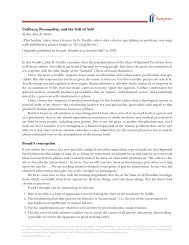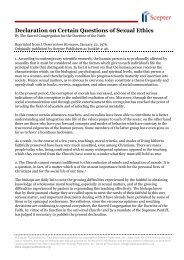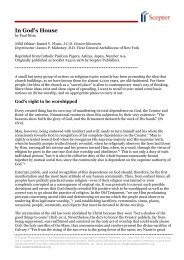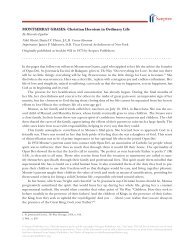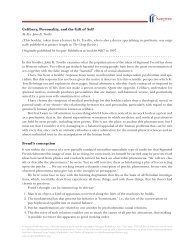by Joseph Soria - Scepter Publishers
by Joseph Soria - Scepter Publishers
by Joseph Soria - Scepter Publishers
Create successful ePaper yourself
Turn your PDF publications into a flip-book with our unique Google optimized e-Paper software.
We need to be orderly, for in this way we obey God’s plan, according to which each thing is put in its<br />
place. We need to be punctual and make good use of our time. We need to observe the proper hierarchies<br />
in our ways of thinking, acting, dressing, relating to others, dealing with God, and planning our future.<br />
Of course we can’t always act explicitly and consciously for the ultimate end of realizing God’s plan,<br />
but the final reason for which we live, think, and work with order should be clear in our mind. We need to<br />
understand that we are cooperating personally (although to us it might appear that ours is an insignificant<br />
contribution) in the order desired <strong>by</strong> God our Father in creating and preserving the universe.<br />
As long as our will does not reject this fundamental motive, we should not be upset if, in living order,<br />
we find that we are immediately or consciously motivated <strong>by</strong> concerns for efficiency or frugality with respect<br />
to time and material. We may be interested in keeping ourselves calm and self-possessed, or respecting our<br />
neighbor who suffers because of our disorder. We may be motivated <strong>by</strong> our temperament or aesthetic sense.<br />
But as often as possible we should try to rectify our intentions, offering to God the order that we are trying<br />
to live, and doing “everything for love.—In that way there will be no little things: everything will be big.”<br />
The glory of God<br />
Everything is ultimately directed to the same end, namely, the glory of God. This is why the rectification of<br />
our intentions—before, during, and after our actions—is an indispensable Christian practice that enables<br />
us to give all the glory to God without retaining any of it for ourselves.<br />
Before our actions, we rectify our intentions <strong>by</strong> offering them to God and <strong>by</strong> purifying the motives. We<br />
do this <strong>by</strong> eliminating reasons that are tainted with sin, whether they be motives of vanity, egoism, revenge,<br />
impurity, greed, and so on. The most frequent enemy of rectitude of intention is seeking, either implicitly<br />
or explicitly, one of the objectives implied in the seven capital sins—pride, greed, lust, gluttony, envy, anger,<br />
and sloth.<br />
While acting, we rectify our intentions <strong>by</strong> avoiding consenting to the temptations which invite us—like<br />
Adam and Eve—to indulge in the sweet and enticing, but poisonous, fruit of self-satisfaction.<br />
Finally, we rectify our intentions after performing our duties “<strong>by</strong> penance and greater self-giving,”<br />
where<strong>by</strong> we learn from our past errors in order to avoid repeating them.<br />
The criteria of order<br />
St. Augustine defined order as “a disposition of equal and unequal things, which gives each of them its<br />
proper place.” As such, to have order means not only keeping in their proper places those things that we<br />
use or are around us, but principally and fundamentally keeping our thoughts and desires ordered so that<br />
we can properly order our actions. St Thomas tells us that if we want to order various things we need to see<br />
them in relation to their end or purpose, “for the order of various things among them-selves is dependent<br />
on the order that they have towards their end.”<br />
To have order in one’s ideas—to order one’s mind—one must begin <strong>by</strong> establishing a hierarchy. That is<br />
to say, we need to know which truths are properly subordinated to others, and which need always to prevail<br />
in determining our decisions. In this sense, we have to give priority to the truths that deal, directly or indirectly,<br />
with our relation to God and our eternal salvation; for “what does it profit a man if he gain the whole<br />
world, but suffer the loss of his own soul?” After these come the variety of natural truths—philosophical,<br />
biological, physical, and so on. Finally and least important are our matters of opinion—that is to say, our<br />
own views regarding what is beautiful, better, more suitable, and so forth, but which we have no right to<br />
impose on others as dogma.<br />
© <strong>Scepter</strong> <strong>Publishers</strong>, Inc. This information protected <strong>by</strong> copyright of <strong>Scepter</strong> <strong>Publishers</strong>, Inc., New York, NY USA. It is for the free use of readers,<br />
and may be redistributed without permission. None of this information can be sold, either in electronic or print form, unless permission<br />
has been obtained from <strong>Scepter</strong> <strong>Publishers</strong>, Inc. Direct all inquiries to info@scepterpublishers.org.<br />
www.scepterpublishers.org



